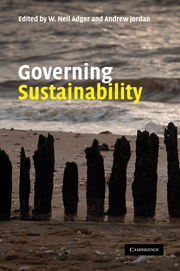Book contents
- Frontmatter
- Contents
- List of figures
- List of tables
- List of contributors
- List of abbreviations
- Foreword by Jonathon Porritt CBE
- Preface
- Part I Overview and Context
- Part II Governance and Government
- Part III Governance and Civil Society
- Part IV Governance and Decision Making
- 9 Participation, precaution and reflexive governance for sustainable development
- 10 Precaution and the governance of risk
- 11 Economics and the governance of sustainable development
- 12 Sustainability, welfare and value over time
- Part V Conclusions
- Index
- References
11 - Economics and the governance of sustainable development
Published online by Cambridge University Press: 05 June 2012
- Frontmatter
- Contents
- List of figures
- List of tables
- List of contributors
- List of abbreviations
- Foreword by Jonathon Porritt CBE
- Preface
- Part I Overview and Context
- Part II Governance and Government
- Part III Governance and Civil Society
- Part IV Governance and Decision Making
- 9 Participation, precaution and reflexive governance for sustainable development
- 10 Precaution and the governance of risk
- 11 Economics and the governance of sustainable development
- 12 Sustainability, welfare and value over time
- Part V Conclusions
- Index
- References
Summary
Introduction
In this chapter we assess the role of economics in the governance of sustainable development. First, we investigate how well the mainstream environmental and resource economics paradigm has helped us understand the nature of sustainable development. We explain the context in which this paradigm developed and the main propositions made during its formative years. These help us to understand the paradigm's approach to sustainable development (or sustainability – we do not distinguish between these two terms, although some do). Taken to the limits of formalism, it culminates in the social planner's desire to optimise human welfare over time and the drive to place monetary values on, and aggregate, all forms of wealth, including natural assets. This chapter then outlines the strengths and weaknesses of this paradigm by comparing it with an alternative set of approaches that have come to be known as ecological economics.
Our second question is, how can economics inform governance systems for sustainable development? Thus the final section of this chapter reflects on the contributions that economics can make to the policy process, using two high-profile examples: the Copenhagen Consensus devised by Bjørn Lomborg (Lomborg, 2001) and the Stern Review of the Economics of Climate Change (Stern, 2007). Although economic analysis has much to offer (for example in the design of policy instruments for delivering sustainable development), we caution firmly against a reliance on formal modelling to prescribe a single, optimal path of policy.
- Type
- Chapter
- Information
- Governing Sustainability , pp. 259 - 282Publisher: Cambridge University PressPrint publication year: 2009
References
- 2
- Cited by



